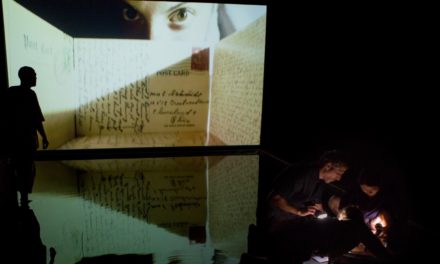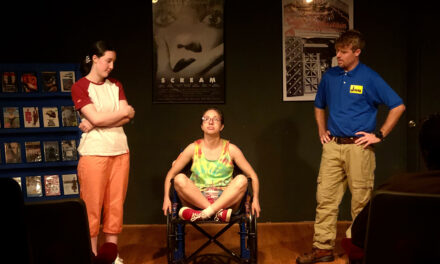“On Wednesdays, we wear pink,” affirms Regina George in the 2004 cult classic comedy Mean Girls. George, leader of The Plastics, is the Queen Bee, the hottest girl in school, and definitively blonde. Oh, and she’s mean. Like really really mean. And, while Tina Fey’s breakout film—and now hit Broadway musical—revolves around the world that George has created, it ultimately shies away from any meaningful discussion about race, ethnicity, queerness, drug usage, and politics.
So, what happens when Mean Girls meets Narcos? What happens when the pervasive Whiteness of Mean Girls is distorted through a Jewish Latinx intersectional feminist filter and The Plastics become the Dead Leaders Club? The blonde leader with the perfect body becomes a butch queer Latina? The new girl from Africa becomes the mysterious girl whose dad may or may not be famed drug lord Pablo Escobar? While these questions may seem far-fetched, they are precisely where playwright Alexis Scheer grounds the exciting new play Our Dear Dead Drug Lord, which will receive a workshop production under the direction of Rebecca Bradshaw at Off the Grid Theatre Company from August 17 to September 1, 2018, in Boston, MA.
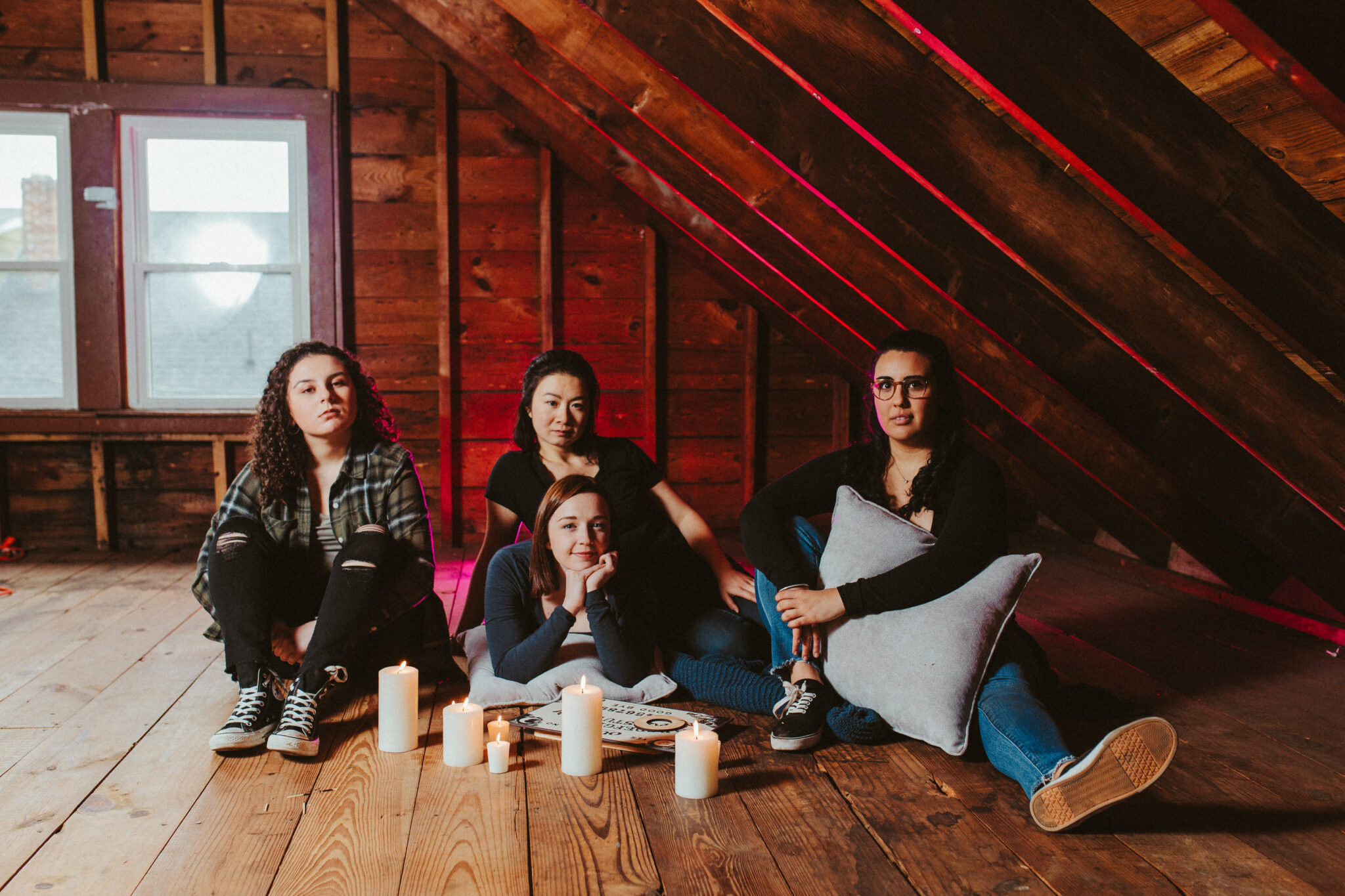
Gina Fonseca, Lisa Joyce, Khloe Alice Lin, and Tatiana Isabel Gil in Our Dear Dead Drug Lord. Photo by Ally Schmaling.
In a bold, but completely justified move, Off the Grid is using the tagline: “The new play everyone is already talking about.” Indeed, anyone who knows even a minute detail about the play knows that this is a force to be reckoned with. Scheer’s play received a staged reading at the Latinx Theatre Commons Carnaval of New Latinx Work at The Theatre School at DePaul University on July 19, 2018, where the energy in the theatre was palpable. When the show ended, the nearly sold-out audience quickly rose to its feet and offered the cast and crew a very warm standing ovation. Now, standing ovations may be common in some places, but they surely aren’t common for industry-focused staged readings. Our Dear Dead Drug Lord is that special.
Rather than look at the present political moment or even imagine the future, Scheer instead swings the pendulum backwards to comment on the past and how the names and dates may have changed, but the issues ultimately haven’t. The play is set before and after the 2008 presidential election, an event that informs how each of the four girls experiences their identity. As the girls frequently comment, the Dead Leader Club’s President, Pipe, is a Republican even though she routinely rejects this label, the McCain sign in her front yard notwithstanding. Scheer sprinkles little tidbits of nuance to each character, effectively creating fully-fledged, multi-dimensional depictions of contemporary girlhood, not unlike the wildly popular and transformative new play The Wolves by Sarah DeLappe. Rebecca Martinez, who directed the staged reading at Carnaval notes how important this type of work is:
As a Latina, I grew up in a culture in which I was constantly fed messages about how girls are supposed to “act,” how my older brothers could learn to box, but girls had to be quiet and “good.” I was never given the tools to process feelings of pain, loss, and rage. This play tears down those antiquated patriarchal notions of female behavior. Alexis’ voice is energetic and vital and her work makes a lot of noise, which is exactly what we need.
By any account, the play is a raw look at the violence and eroticism of girlhood. In an interview on the 50 Playwrights Project, Scheer notes:
My mom is [understandably] horrified that I wrote this play. I, too, hold my breath and break a sweat every time I hear it in workshops. Sometimes I wonder if plays are like children—loud and constantly flirting with trouble—trying desperately to articulate their experience of the world with only the words you taught them.
Scheer offers no apologies and holds back no punches. Put simply, audiences are hungry for these stories of not only girlhood but more importantly girls being bad and doing things that society doesn’t expect them to do. And while we see them perform witchcraft, do drugs, talk explicitly about sex, and do some other things I’ll leave to your imagination, one must wonder why we expect this behavior from boys, but when girls do it, it’s considered taboo. To use some words my mother would disapprove of, Scheer says “fuck that” (sorry, mom!). Like its counterpart, Mean Girls (not to mention Heathers), we don’t just like watching girls being bad, we actually kind of sort of love it.
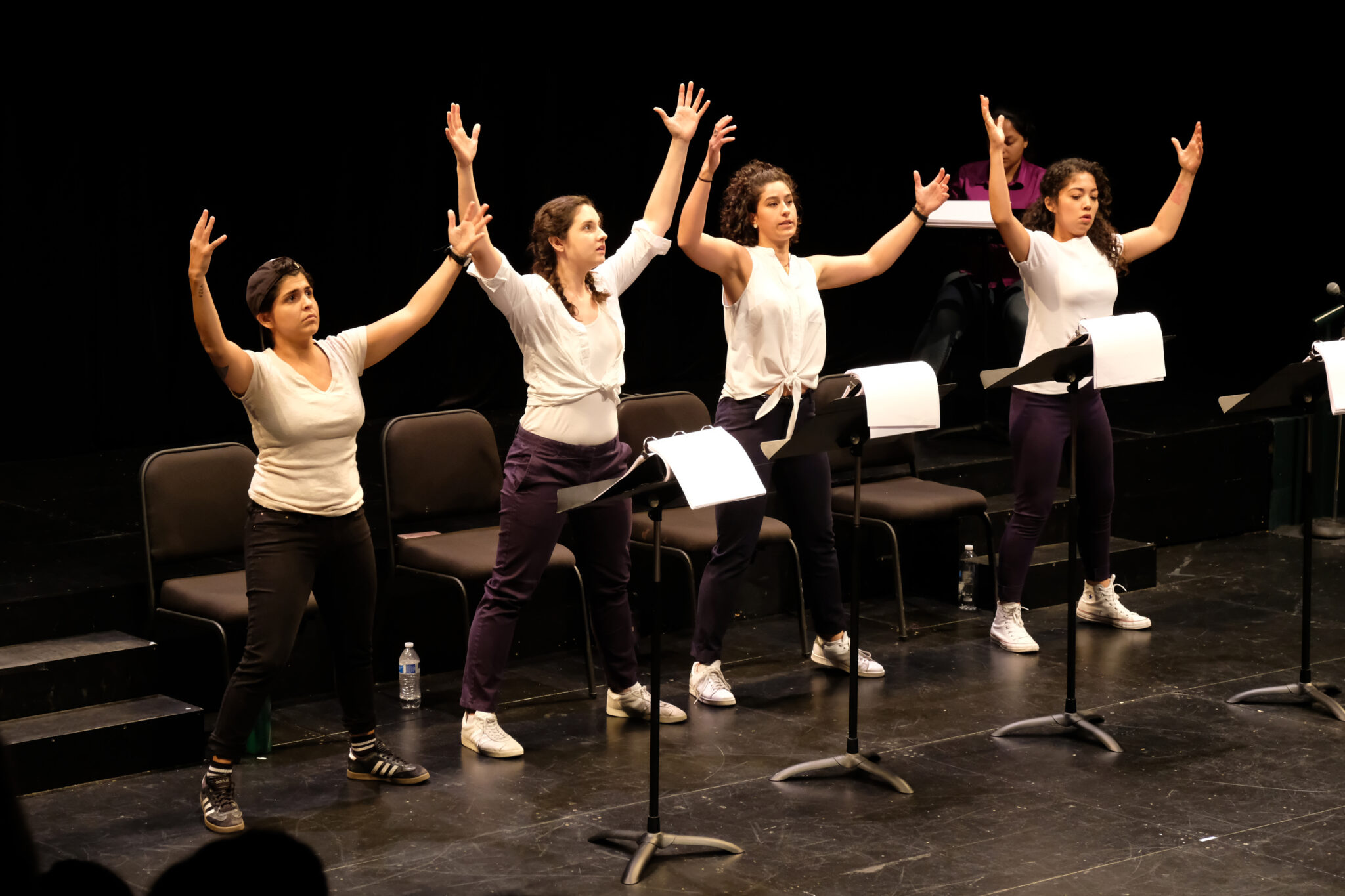
The cast of Our Dear Dead Drug Lord at Carnaval. Photo by Joel Maisonet.
Following a development workshop in the Black Swan Lab at Oregon Shakespeare Festival under the guidance of Amrita Ramanan, Scheer turned her attention to Chicago where she collaborated with director Rebecca Martinez. Under Martinez’s leadership, the play grew in surprising ways. According to Martinez:
As a director working on a new play, I’m a listener first. I ask a lot of questions, mainly to see how can I help the playwright communicate what they want to say. I try to let the answers guide my process. Alexis and I had a couple of conversations about the play before we got to Chicago for Carnaval, and in those we dug into a few specific parts, to uncover what was important to Alexis to clarify as she did rewrites. She made some significant changes to the play before we got into the rehearsal room, so our rehearsals focused on clarity of speech, intentions, relationships, and tempos with the actors. And since we had the luxury of 13 hours of rehearsal, I worked with Alexis to see what moments would be helpful for her to see staged. And when Alexis asked if we could stage a dance, the answer was YES. (But as a devising choreographer, that answer is always yes.)
For Scheer, working with Martinez proved to be transformative in developing the play. Like other Carnaval plays, the process curated by Lisa Portes allowed Scheer and Martinez space to discuss the play before the actors arrived.
Ahead of the festival, I was in conversation with Rebecca Martinez (director of the reading) unpacking the cultural context and significance of different elements of the play, says Scheer, adding, And that dialogue was a great impetus to investigate and reevaluate some of the initial impulses I had, and move closer to what I think the play actually is.
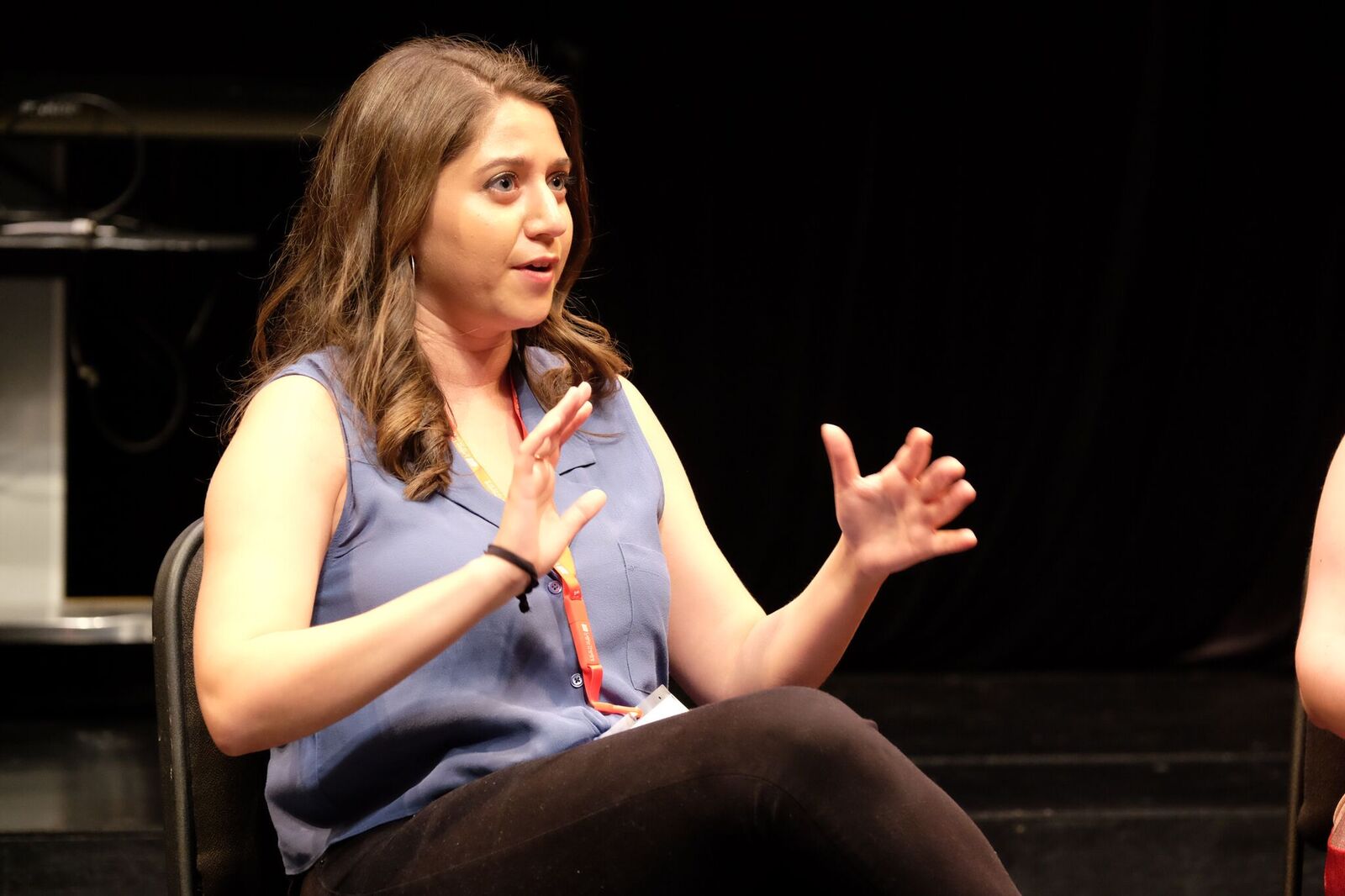
Alexis Scheer at Carnaval. The cast of Our Dear Dead Drug Lord at Carnaval. Photo by Joel Maisonet.
One of Scheer’s major takeaways from Carnaval was learning new ways to collaborate on new play development, a process which actually became less about the play itself and more about playmaking.
I think what I’ve really landed on is the role of the playwright in a room full of collaborators. It’s not to give all the answers, it’s to align instincts, Scheer. Development is like drawing a map, handing it off to someone, and seeing how they use it to get from one place to another while you sit shotgun.
To say that Alexis Scheer’s voice is one of the most excited new voices writing for the American Theatre would be a gross understatement. Our Dear Dead Drug Lord is a testament to this excitement. Scheer has taken risks in writing such a provocative play. Now producers and audiences must take their own risks. You’d be surprised just how much fun you can have in a theatre when Scheer’s steering the ship (or scooping the ice cream at Cold Stone).
Performances of Our Dear Dead Drug Lord are scheduled for August 17 through September 1 at Roberts Studios Theatre at Calderwood Pavilion, 527 Tremont St., Boston, MA. For information visit www.offthegridtheatre.com. $20-$30.
This post was written by the author in their personal capacity.The opinions expressed in this article are the author’s own and do not reflect the view of The Theatre Times, their staff or collaborators.
This post was written by Trevor Boffone.
The views expressed here belong to the author and do not necessarily reflect our views and opinions.




